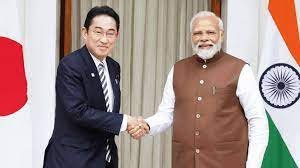Japanese Ambassador to India Hiroshi Suzuki shed light on the upcoming G-7 summit, where the war in Ukraine is set to be a prominent topic of discussion for the second time. Suzuki emphasized Japan’s commitment to upholding the international rules-based order and ensuring that Russia faces consequences for its actions. The ambassador also touched upon other key developments, including U.S. President Joe Biden’s decision to cut short his visit to the Pacific region, Japanese Prime Minister Fumio Kishida’s new Indo-Pacific policy, and plans to align the G-7 and G-20 agendas through coordination with Indian Prime Minister Narendra Modi.
The war in Ukraine has continued to escalate, posing a significant threat to regional stability and the international order. Prime Minister Kishida seeks to highlight this issue at the G-7 summit, emphasizing the importance of addressing Russia’s aggressive actions and holding them accountable for their violations of international norms. Japan stands firmly in support of a rules-based international system and believes that maintaining the integrity of this framework is vital to regional and global security.
Ambassador Suzuki expressed Japan’s concern over President Biden’s decision to curtail his visit to the Pacific region. However, he also acknowledged the challenges faced by the U.S. administration in balancing domestic and international priorities. Despite these circumstances, Japan remains committed to deepening its alliance with the United States and enhancing cooperation on regional and global issues.
Prime Minister Kishida recently unveiled a new Indo-Pacific policy, reflecting Japan’s evolving geopolitical outlook. The policy aims to foster a free and open Indo-Pacific region through initiatives related to connectivity, infrastructure development, and maritime security. Japan seeks to work closely with like-minded countries to promote peace, stability, and prosperity in the region, ensuring that shared values and principles are upheld.
To align the agendas of the G-7 and G-20, Prime Minister Kishida intends to coordinate closely with Prime Minister Narendra Modi of India. Both Japan and India are committed members of these important multilateral platforms, and their collaboration could serve as a catalyst for meaningful dialogue and action. By aligning priorities, the G-7 and G-20 can strengthen their collective influence and address critical global challenges more effectively.
War in Ukraine will be a central focus of the G-7 summit, where Japan aims to uphold the international rules-based order and ensure accountability for Russia’s actions. Ambassador Suzuki emphasized Japan’s commitment to deepening its alliance with the United States despite recent developments. Prime Minister Kishida’s new Indo-Pacific policy underlines Japan’s determination to promote a free and open region, while coordination with Prime Minister Modi of India seeks to align the G-7 and G-20 agendas. Japan’s proactive stance in addressing global challenges highlights its commitment to contributing to regional and global stability.


